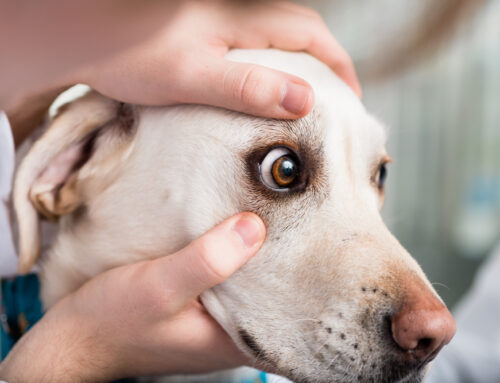Toxicosis (i.e., accidental poisoning) is one of the most common—and most preventable—pet emergencies we see at Southern Arizona Veterinary Specialty and Emergency Center, likely because many pet owners don’t realize that many everyday household items are toxic to pets.
Knowing how to identify and address these domestic hazards—and recognize active toxin ingestion signs in pets—are the first steps toward protecting your dog or cat from harm.
How to recognize toxin ingestion signs in pets
Sometimes, recognizing that your pet is in trouble is easy—you catch them in the act or discover evidence, such as chewed or partially eaten packaging—but if your pet is exposed while not supervised, you must rely on visible clinical signs. Prompt veterinary attention can be the difference between life and death, so seek immediate veterinary care if your pet experiences warning signs, including:
- Frequent vomiting
- Persistent drooling
- Diarrhea
- Rapid heart or respiratory rate while resting
- Restlessness or agitation
- Increased thirst and urination
- Loss of coordination
- Mental dullness
- Muscle tremors or twitching
- Pale, grey, or blue gums
- Seizures
- Collapse
How to respond to pet poisoning
If you know or suspect that your pet has been exposed to something toxic, stay calm—pets react to their owner’s stress and may become fearful or agitated, which can worsen their condition or make them more challenging to transport. Instead of worrying, take action.
- Don’t wait and see — Toxicity signs may not appear right away. Fast intervention is critical to minimize complications.
- Note the time — Knowing approximately when your pet was exposed to a toxin can help your veterinarian determine appropriate treatment.
- Act fast — Immediately call Southern Arizona Veterinary Specialty and Emergency Center for guidance, and prepare your pet for transportation.
- Gather any packaging — Active ingredients and concentrations can vary by product, so take any available wrapping or identifying information to the veterinary hospital.
Keep these common toxins away from your pet

Familiarizing yourself with the most common pet toxins can help you take proactive measures to protect your dog or cat from accidental ingestion and avoidable emergencies.
- Food toxins — Harmful foods are frequently given to pets by uninformed friends or family, stolen from counters or tables, lapped from spills, or dragged from the trash. Keep the following items out of reach at all times:
- Xylitol
- Grapes, raisins, and currants
- Macadamia nuts
- Onions, garlic, and chives
- Alcohol
- Caffeine
- Yeast dough
- Chocolate (i.e., dark and bitter chocolate, including cocoa powder, unsweet, and semi-sweet chocolate)
- Medications — Prescription and over-the-counter (OTC) medications have been the leading toxicity cause in pets for the past 10 years. Pets frequently encounter pills, capsules, and tablets in unattended bags, purses, pockets, and on countertops and nightstands. Depending on the medication and the pet’s size, as little as one dose can cause rapid and life-threatening harm. Veterinary medications and supplements (e.g., flavored tablets and chews) can be equally hazardous when ingested in large quantities and should be securely stored out of reach.
- Lilies and toxic plants — Lily ingestion causes acute kidney failure in cats, and is often rapidly fatal. Pet owners should closely inspect floral arrangements for lilies and other harmful flowers and restrict pet access to toxic plants, including amaryllis, autumn crocus, cyclamen, daffodils, hyacinth, dieffenbachia (i.e., dumb cane), marijuana, Sago palm, oleander, and tulip bulbs. Visit the ASPCA for a searchable database of toxic and non-toxic plants.
- Essential oils — Many popular essential oils are poisonous to cats and harmful to dogs. These oils may be inhaled through aerosolized droplets, absorbed through the skin while grooming, or ingested directly from a spill or dispersing container. Respiratory distress, bradycardia (i.e., low heart rate), severe nausea, and acute liver failure are possible complications in cats.
Consult your pet’s veterinarian before using essential oils—including those deemed pet-safe—around your cat or dog.
- Rodenticides — Rat and mouse baits contain lethal ingredients that can cause brain swelling, kidney failure, or uncontrolled bleeding in pets. Because these baits are often flavored and come in a variety of formulas (e.g., pellets, blocks, powders), they are tempting to curious pets. Sadly, toxicity signs may not appear for days after the event and by that time the damage is often irreversible.
Pet owners should inspect their garages, basements, and home foundation for rodenticides and replace them with humane traps or other pet-safe alternatives.
- Ethylene glycol — Ethylene glycol is the active ingredient in many automotive antifreeze products, as well as brake fluid, windshield deicer, and coolant. Affected pets often encounter these items spilled on driveways and garage floors. When ingested, this sweet-tasting compound attacks the kidney tissue and results in acute renal failure, often within 72 hours.
- Snail and slug baits — These are a common hazard for dogs and cats who like to spend time in the garden. Slug and snail baits contain metaldehyde, which causes muscle tremors, seizures, and severe hyperthermia (i.e., high body temperature ). Without prompt treatment, pets can suffer life-threatening organ damage.
How is toxicosis treated in pets?
Your pet’s emergency care at Southern Arizona Veterinary Specialty and Emergency Center will vary based on the toxin type and quantity ingested, as well as their current status and time of exposure. When you arrive, our emergency team will move quickly to initiate decontamination or provide necessary stabilization. Hospitalization, monitoring, and aggressive treatment are generally necessary for pets showing clinical signs.
Protecting your pet from common toxins begins at home. Check your indoor and outdoor spaces for hazardous items and take preventive measures to protect your pet. If you know or suspect your pet has been exposed to a toxin, don’t delay—our skilled emergency team can triage your pet’s condition over the phone and determine your next steps.
No matter what your pet needs—or when—you can trust the specialized care at Southern Arizona Veterinary Specialty and Emergency Center. Contact our team right away.








Leave A Comment